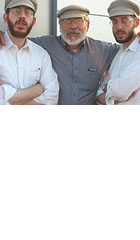
Hiding and Seeking: Faith & Tolerance After the Holocaust 2003
Distributed by First Run/Icarus Films, 32 Court St., 21st Floor, Brooklyn, NY 11201; 800-876-1710
Produced by Menachem Daum & Oren Rudavsky
Directed by Menachem Daum & Oren Rudavsky
VHS, color, 84 min.
Jr. High - Adult
Holocaust and Genocide Studies, History, Human Rights, Jewish Studies, Multicultural Studies
Date Entered: 06/18/2004
Reviewed by Patricia B. McGee, Coordinator of Media Services, Volpe Library & Media Center, Tennessee Technological UniversityHiding and Seeking is filmmaker Menachem Daum’s second documentary in a planned trilogy dealing with the legacy of the Holocaust on the Jewish community. Daum believes that we are living in a time when “every religion is in danger of being high-jacked by extremists.” He is particularly concerned about what he perceives is the Orthodox Jews’ closing themselves from the outside, non-Jewish world and their expressions of hatred toward gentiles. His two adult sons, who spend their days in study of the Talmud, are full time Yeshiva students living with their families in Jerusalem, and really would rather not be bothered by the questions about tolerance and faith raised by their father.
Daum takes his sons to Poland, to the country they view as a land of total darkness, and where their mother’s father and his two brothers were hidden from the Nazis for 28 months. He’s not trying to change his sons or undermine their faith, but rather wants to expand their consciousness to understand that holiness can be found in all people. Akiva and Tzvi Dovid are less than enthusiastic; Akiva calls the trip and the filming “a perfect waste of time,” and Tzvi Dovid refers to it as the “family hajj.” Attitudes changes when the Daums meets the Polish family who risked their lives to save the Jews. The young men are moved to tears by the story of their courage.
Fear and mistrust abound on both sides. More than fifty years have passed since the end of the war, yet at times the Daum family is visibly uncomfortable and suspicious of Polish people. Fearful of Polish anti-Semitism, the Federman brothers never contacted the Mucha family after the war. The Mucha family was resentful and bitter, wondering about the fate of the three young men, and regretting they had not been compensated for their risk. In a profoundly moving ceremony much of the bitterness and fear is healed when the Israeli government honors the Mucha family with the Righteous Among the Nations designation. Menachem Daum has raised many questions for which there are no easy answers. Why did the Mucha family hide the Jews? Why did the Federmans never acknowledge their aid after the war? This engrossing documentary provides much material for discussion. It is unfortunate that the filmmakers chose to give their film the look of a home movie. At times the camera work distracts from the very complex issues raised by this story. Regardless of this small caveat, Hiding and Seeking is a significant examination of historical events and their legacy and a positive addition to library collections.